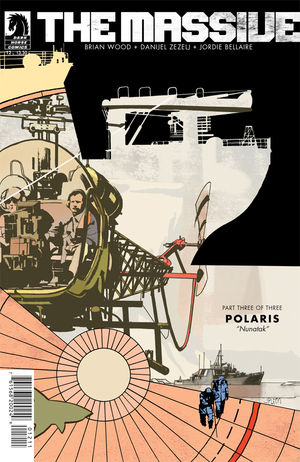Comics /
Comic Reviews /
More Comics
The Massive #12 Review
By Zak Edwards
May 22, 2013 - 20:03
Spoilers Ahead (and a whole lot of gushing)!
I did not expect this to happen, I really didn’t. I figured The Massive the ship and The Massive the comic would never really, actually meet. But here we are, a moment of discovery where the ship meets its seekers, where Brian Wood and co. tell an incredible and moving story that is just not found in any medium that often. The Massive (the series) has been a continual quiet yet powerful story, often placing much of the action of the plot into quick summaries in favour of a more intricate look at both the world and the people who inhabit it. The series is at once beautiful and devastating, and this issue contains absolutely everything of what makes The Massive incredible, and the “Polaris” arc dovetails into a thing of beauty.
 |
This issue is the last of the “Polaris” story arc, a three-part series of self-contained single-issues that now come together, connected not so much by plot but by thematics and tone. Not that this issue wouldn’t be an experience without reading the others, but these seemingly independent stories culminate here in many ways, and it’s nice to see some pay-off to both short-term mysteries and long-term tensions in the series overall. The issue itself uses interconnected stories like the last two, juxtaposing flashbacks with current events to thematically tie a larger story together. The use of space here is incredible, with large single-page spreads emphasizing Captain Callum Israel’s walk into the Arctic night towards
The Massive playing visually off the oranges, yellows, and reds of his origin story with how he bought his own ship,
The Kapital. The two stories play off each other visually in a way that helps maintain tension in Callum’s hike across the winterscape, holding his mortality in stark contrast to his former invincibility. But this is a culminating moment of the series thus far, and so we finally reach the titular ship. This discovery of
The Massive (the ship) by Israel is a simple, quiet, and powerful moment: after whole pages dedicated to his Arctic alienation, Callum encounters his quest object, as empty and desolate as his journey there. The horror of a dead ship, caught in the ice like his own ship may be in mere moments, is simply breathtaking, no wonder Callum himself collapses. Sure, this could be a ruse, a cancerous hallucination, but I think Israel’s partner touching
The Massive and declaring “It doesn’t end here” opens the story up to more exploration. That exploration can be ‘Season 2,’ as comics sometimes like to say, and I will be around for the ride. Comics rarely get better than this.
The art is poetic, it is simply that, and you can tell Danijel Zezelj has paneled with poetry in mind. There are spaces, full stops, ‘commas,’ and other moments in this piece that work in a more literal poem than the term ‘poetic’ is usually used for, and it works to the benefit of the entire book. It isn’t a comic waiting to be a film, long since abandoning the ‘widescreen’ movement that still dominates most comics, and is instead coming back to more literary roots. I have to say, I did not expect the series would ever find their titular quest, but this moment I’ve already talked about at length, with Israel alone in the arctic wild, a place where the Earth’s weather manifests so very strongly (and the whiteness of the landscape certainly aids in Danijel Zezelj’ artistic choices), we have a powerful, powerful feeling. Good poetry feels, intrinsically, and people know it when they see it. It isn’t simply angry words, or appeals to the audience’s emotions, good poetry feels within itself, and this moment has that. It doesn’t play to sympathy, it plays to literary conceits, and it is beautiful.
That being said, the art initially threw me off. There’s one panel in particular, with extremely heavy inking and blank expression, where I decided, at least momentarily, that I disliked the art, but it obviously grew on me. Danijel Zezelj’s heavy lines obscure and fade out faces, which makes sense for the environment, but leaves most characters looking either stone-faced or simply unreadable. There are other moments, like in the case of Callum's gun, where a Phillip Bond style of cartoonish exaggeration comes in as well, which is also jarring. But the artwork, perhaps like the story itself, moves in broader strokes, focusing for moments to discuss much larger narratives and, while the art works on this larger scale, zeroing in on single panels can be quite alienating.
Grade: 9.5/10 The best issue thus far and proof of what comics can and are when they want to be.
Last Updated: January 17, 2025 - 08:20
